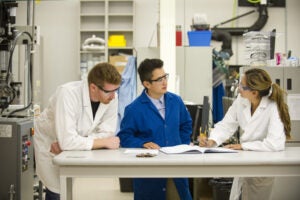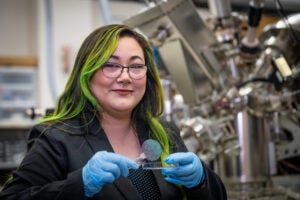Learn more about our options!

Bachelors of Science
The ABET Accredited Bachelors of Science is a four-year program preparing students for roles in a variety of fields including semi-conductors, automotive, and other industries. Many graduates also continue to pursue advanced degrees.

Minor in Materials Science and Engineering
A minor in materials science and engineering may be right for you if you want to blend your love of multiple fields with materials science and engineering.

Certificate in Semiconductor Materials
Interested in pursuing a career in Idaho’s fastest growing job market! The semiconductor materials certificate can help you customize your engineering or science degree and set you up for your desired career!
We’re Here to Support You!
Our professional student support staff can help you decide on your program, or find your way through it!
Meet Cindy!
Cindy Hardy is a professional advisor with the College of Engineering! Reach out to her to learn about MSE as well as the admissions and onboarding processes for new students.
Meet Jessica
Jessica Economy is the MSE Academic Programs Manager and is here to support students through all aspects of their academic career.
Program Educational Objectives
Within a few years of graduation, materials science and engineering graduates will be:
- Able to operate as effective engineers or scientists in materials industries, academia, or related fields.
- Well-rounded individuals who both understand the principles and can undertake the practice of the science and engineering of materials.
- Fully qualified as materials engineers, with an ability to adapt and progress in a rapidly changing field.
Student Outcomes
At the time of graduation, materials science and engineering students will possess an ability to:
- Identify, formulate, and solve complex engineering problems by applying principles of engineering, science, and mathematics.
- Apply engineering design to produce solutions that meet specified needs with consideration of public health, safety, and welfare, as well as global, cultural, social, environmental, and economic factors.
- Communicate effectively with a range of audiences.
- Recognize ethical and professional responsibilities in engineering situations, and make informed judgments, which must consider the impact of engineering solutions in global, economic, environmental, and societal contexts.
- Function effectively on a team whose members together provide leadership, create a collaborative and inclusive environment, establish goals, plan tasks, and meet objectives.
- Develop and conduct appropriate experimentation, analyze and interpret data, and use engineering judgment to draw conclusions.
- Acquire and apply new knowledge as needed, using appropriate learning strategies.